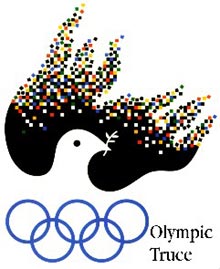 古希臘是一個尚武的民族,在當時古希臘民族是以城邦為單位的分散小國。他們各自為政,城邦間常有并吞和爭奪,沒有統一的君主。連年的戰爭需要體格健壯、行動敏捷的士兵。所以集會比武是當時君主所發明的一項培養合格士兵的手段。伊利斯城邦人占據著奧林匹亞,而斯巴達人一直想并吞這塊圣地。伊利斯城邦人頑強抵抗,而斯巴達人久攻不破,人民渴望和平,念祭祀和慶典活動。
古希臘是一個尚武的民族,在當時古希臘民族是以城邦為單位的分散小國。他們各自為政,城邦間常有并吞和爭奪,沒有統一的君主。連年的戰爭需要體格健壯、行動敏捷的士兵。所以集會比武是當時君主所發明的一項培養合格士兵的手段。伊利斯城邦人占據著奧林匹亞,而斯巴達人一直想并吞這塊圣地。伊利斯城邦人頑強抵抗,而斯巴達人久攻不破,人民渴望和平,念祭祀和慶典活動。
于是,伊利斯王和斯巴達王在公元前884年達成了一項定期在奧林匹亞舉行集會(即奧林匹克運動會)的協議,并簽定了《神圣休戰條約》。條約規定在舉行奧林匹克運動會期間,凡是攜帶武器進入奧林匹亞的人,也被認為是背叛了神的人,當受到懲罰;有力量而不懲罰這種背叛神的行為的人,也被認為是對神的背叛。
《神圣休戰條約》還規定希臘各城邦不管任何時候進行戰爭,不允許侵入奧林匹亞圣區。即使是戰爭發生在奧運會舉行期間,交戰雙方都必須宣布停戰,準備參加奧林匹克運動會。停戰時間開始規定1個月,后延至3個月。停戰期間,凡是參加奧運會的人,都將受到神的保護,是神圣不可侵犯的。
《神圣休戰條約》在當時起到了熄滅戰火的保障作用,奠定了把奧運會作為和平、友誼象征的基礎。它保證了古奧運會如期舉行,不因戰爭而中斷,這對維護促進各民族之間的團結友誼起到了積極作用,也推動了古希臘文化的發展。可以說古代奧運會是地理、政治、經濟、宗教、戰爭相互作用的共同產物,而促進和平友好,反對侵略戰爭、慶賀豐收和祭祀神靈等則是它的宗旨。
The tradition of the "Truce" or "Ekecheiria" was established in ancient
Greece in the 9th century BC by the signature of a treaty between three kings.
During the Truce period, the athletes, artists and their families, as well as
ordinary pilgrims, could travel in total safety to participate in or attend the
Olympic Games and return afterwards to their respective countries.
In the past, Olympic Truce helped people and countries avoid wars and
conflicts, and helped people develop exchanges and build friendship.
The International Olympic Committee (IOC) decided to revive this ancient
concept in order to protect the interests of the athletes and sport in general,
for it can still play an important role in today's volatile world.
1992年,國際奧委會和聯合國根據奧林匹克休戰原則聯合提出一項倡議,允許前南斯拉夫的運動員參加巴塞羅那奧運會。在2000年悉尼奧運會的開幕式上,韓國和朝鮮的的代表團共同在朝鮮半島旗下入場。
In 1992, the first initiatives were launched by the IOC, in collaboration
with the United Nations, allowing athletes of the former Republic of Yugoslavia
to participate in the Barcelona Games. In 2000, during the Opening Ceremony of
the Sydney Games, the South and North Korean delegations paraded in the stadium
together under the flag of the Korean peninsula.
In July 2000, the International Olympic Truce Foundation (IOTF) was created
with a view to promoting peace through sport and the Olympic ideal.
The Olympic Truce is symbolised by the dove of peace with the traditional
Olympic flame in the background. In a world that is plagued by wars and
animosity, the peace-dove symbol represents one of the IOC's ideals to build a
peaceful and better world through sport and the Olympic ideal.
The Olympic flame has brought warm friendship to all the people of the world
through sharing and global togetherness. In the symbol, the flame is made up of
colourful effervescent elements - reminiscent of festivities experienced in the
celebration of the human spirit. These elements represent people of all races
coming together for the observance of the Truce.